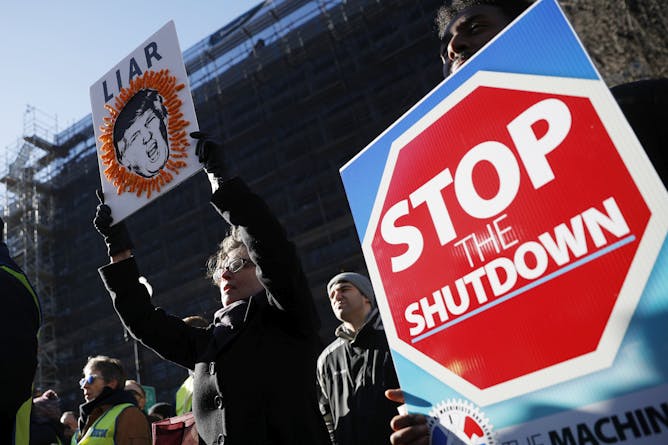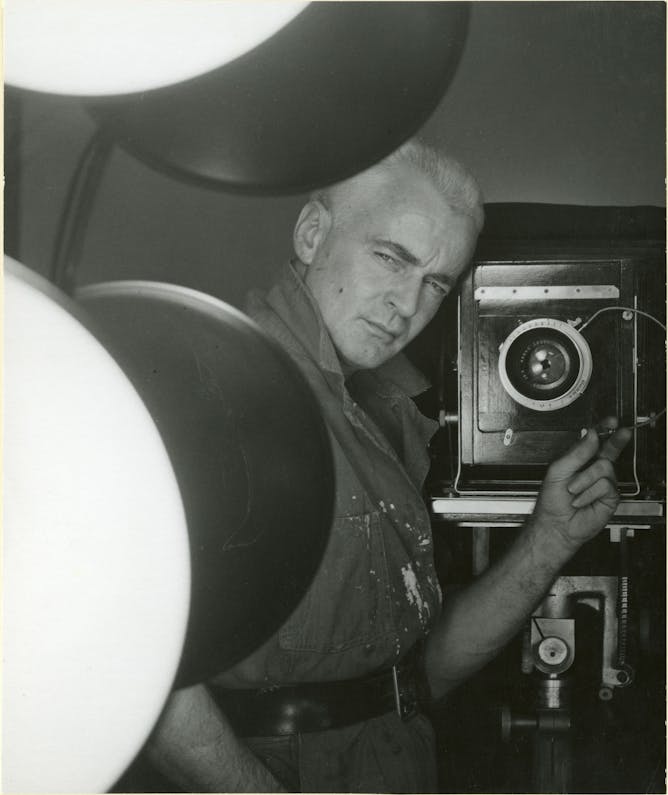|
|
|
Editor's note
|
|
President Trump visited the U.S. border with Mexico yesterday, reiterating his demand that Congress fund a wall to end the partial government shutdown, now in its 21st day. As it ties the record for the longest shutdown in American history, the economic costs are piling up, as workers go without pay and industries feel the impact of reduced government services. Scott R. Baker, a finance professor who looked at the 2013 government shutdown,
explains that the costs are usually small in the short term. But if a shutdown drags on, the economic damage could be severe, he writes.
While a new federal study shines light on the extent of food insecurity among America’s college students, the recommendations don’t go far enough to address the problem, says Suzanna Martinez from the University of California, San Francisco. The campus hunger expert offers up some other solutions that she says would be more effective.
During the first half of the 20th century, George Platt Lynes was one of the world’s most successful commercial and fine art photographers. But to Lynes, a gay man, his most important works were his photographs of nude men, which, due to prevailing attitudes toward homosexuality, he needed to keep hidden away. Indiana University’s Rebecca Fasman tells the story of how Lynes quietly gifted his male nudes to famous sexologist Alfred
Kinsey, who kept the identities of the subjects secret for years. Now many of them are on display for the first time.
|
Bryan Keogh
Economics + Business Editor
|

|
|
Top stories
|

Federal employees rally to call for an end to the partial government shutdown.
AP Photo/Pablo Martinez Monsivais
Scott R. Baker, Northwestern University
The government has been partially closed since Dec. 22, making it the second-longest shutdown on record. A finance professor who studied the 2013 shutdown explains the economic impact.
|

As many as half of America’s college students face campus hunger.
Stokkete/www.shutterstock.com
Suzanna Martinez, University of California, San Francisco
A new federal report on food insecurity on college campuses does a good job of laying out the scope of the problem but falls short when it comes to solutions.
|

A self-portrait of George Platt Lynes from 1952.
Gelatin silver print, 7-5/8 × 9 in. From the Collections of the Kinsey Institute, Indiana University. © Estate of George Platt Lynes.
Rebecca Fasman, Indiana University
Lynes was a highly sought-after commercial and fashion photographer in the 1930s and 1940s. But he had to keep his most important body of work hidden away.
|
|
|
Science + Technology
|
-
John C. Besley, Michigan State University; Bruce W. Hardy, Temple University; Meghnaa Tallapragada, Clemson University ; Shupei Yuan, Northern Illinois University
Researchers found that aggressive messaging and framing current events as a 'war on science' had different effects on how liberals and conservatives felt about scientists' credibility.
-
Charles T. Harry, University of Maryland
As the number of 'internet of things' devices expands rapidly, so do security vulnerabilities to homes, businesses, governments and the internet as as whole.
|
|
|
|
|
|
|
Environment + Energy
|
-
Robert Twilley, Louisiana State University ; Andre Rovai, Louisiana State University
Mangrove forests along the world's tropical and subtropical coasts store enormous quantities of 'blue' carbon – especially in river delta zones, where soil builds up quickly.
-
Cale Jaffe, University of Virginia
Distrusting large federal bureaucracies isn't reserved for conservatives anymore.
|
|
From our International Editions
|
-
Grant Wilson, University of Birmingham; Iain Staffell, Imperial College London
But electric vehicles will pose a significant challenge over the next decade.
-
Edwin Ng, University of Waterloo; Carles Muntaner, University of Toronto
New research shows that female politicians spend more on health and education, improving the well-being of a population.
-
Reuben Loffman, Queen Mary University of London
Felix Tshisekedi may have clinched DRC's presidency but the road ahead won't be a smooth one.
|
|
|
|
| |
| |
|
|
|
|
|
|
|